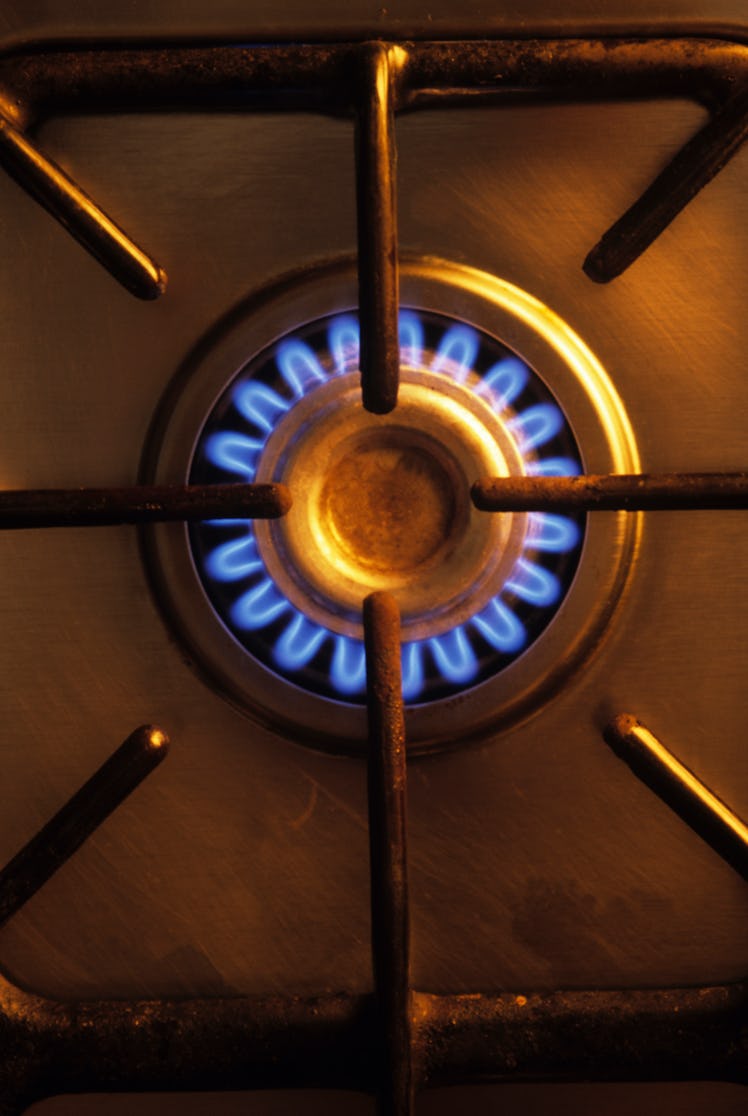Gas Stoves Are As Bad As Secondhand Tobacco Smoke
A new study found that cooking with a gas stove lets off as much benzene as secondhand smoke.

Cooking with gas may not be all it’s cracked up to be. According to new research from Stanford University, carcinogenic gas leaks into the air whenever a gas burner is used — and that carcinogenic gas is as bad as secondhand smoke.
Researchers sampled indoor air in 87 homes with gas and propane stoves in California and Colorado to test for harmful gasses. They found that one lit gas burner on high or a gas oven set at 350 F emits as much benzene as secondhand smoke — far beyond both U.S. and international safety levels. (It’s important to note that gas stoves have been found to leak benzene even when they aren’t on.)
When inhaled, benzene can cause drowsiness, dizziness, increased heart rate or irregular heart rhythm, headaches, tremors, confusion, unconsciousness, and even death if inhaled at very high levels. Long-term exposure to benzene has been linked to non-Hodgkin’s lymphoma, multiple myeloma, leukemia, anemia, reproductive problems in women, low birth weight, and slow bone formation. According to the World Health Organization, there is no safe exposure level.
“Benzene forms in flames and other high-temperature environments, such as the flares found in oil fields and refineries. We now know that benzene also forms in the flames of gas stoves in our homes,” lead study author Professor Rob Jackson said in a statement.
The research team found that levels of benzene in homes with gas stoves can exceed concentrations of benzene found in secondhand smoke. They also noted that benzene didn’t stay in the kitchen; it migrates around the home, and levels found in bedrooms exceeded safe levels in many cases.
Unfortunately, oven exhaust hoods, even those vented directly outdoors, were not effective at removing benzene from the homes. “Good ventilation helps reduce pollutant concentrations, but we found that exhaust fans were often ineffective at eliminating benzene exposure,” said Jackson.
“Gas stoves emit benzene. It’s a potent carcinogen. The danger from this is cumulative, so you don’t need to freak out and throw your stove away tonight. But the risk is there over time,” explained co-author Yannai Kashtan.
This study builds on a previous Stanford study that found gas-powered stoves leak as much methane as 500,000 gas-powered cars annually. Methane is one of the most potent greenhouse gases and can cause respiratory problems in the very young. At high concentrations, methane is combustible.
Based on these and similar findings, several California municipalities have moved to ban gas hookups in any new construction, sparking condemnation from Republicans at the federal level. Last month, the GOP-led House of Representatives passed a bill called the Gas Stove Protection and Freedom Act in an attempt to preemptively restrict the Biden Administrations from banning home gas appliances, something that the President has never mentioned. The issue has become highly politicized, with Republicans claiming government overreach, even though a federal ban isn’t on the table.
“Don’t tread on Florida, and don’t mess with gas stoves!” tweeted Florida Gov. Ron DeSantis in response to the presumed gas stove ban, while Ohio Rep. Jim Jordan tweeted out his support for “God. Guns. Gas stoves.”
For those with gas stoves, although there is no way to completely remove the gas, opening windows and using fans and hoods can help mitigate some of the the potentially harmful effects of benzene and methane in indoor air. If you are a home owner and are looking to make the switch from a gas stove to an electric range, take advantage of the Inflation Reduction Act tax credit that will give you up to $840 to buy a new appliance.